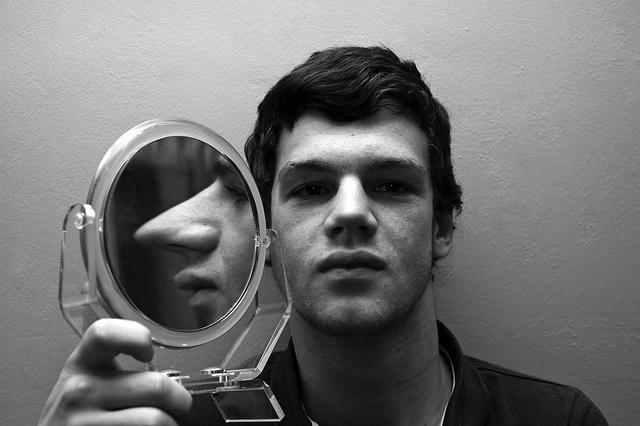
The truth will set you free.
We’ve all heard that nice little adage, but I doubt many of us understand what it actually means. I certainly didn’t…until recently.
Why would the truth set you free? It’s much easier to lie.
We lie all the time—we do it to protect people we love, to avoid hurting others, or just to get through the damn day sometimes. It’s not obvious that telling the truth will set us free—because often, the truth is horrifying.
The smarter children learn to lie before the other kids. It’s like some kind of magic. We can do something bad, but if we lie, then we don’t have to face it. It’s easier to get what we want more quickly through lying to people. Lying can save our asses.
Through my ongoing battle with a serious chronic illness, it has been much easier to lie to people in my day-to-day life than to constantly explain the severity of my symptoms. It doesn’t make sense to bother people with the debilitating and painful reality of my experience, when I happen to be waiting in line for a coffee with someone I went to high school with, or when I run into an old friend of my dad’s at the grocery store. We each have enough trouble in our own lives to be burdened with someone else’s sorrows.
The result: I have become too good of a liar.
The problem with lying is that we can’t repress the truth for long without one of two things happening: either we totally implode, having some kind of mental breakdown—or we become some sort of moral monster who is completely removed from our true, honest feelings. I’d say the latter is more sad.
As my illness has become more complicated, I’ve needed the support of the people in my life to get through this. I’ve been forcing myself to tell the truth—or rather, to attempt to express myself honestly to the best of my ability at every given moment.
The following quote is the most humbling and powerful thing I have ever heard on the value of telling the truth:
“When you talk, it doesn’t mean you are right. It means you are trying to articulate and formulate your thoughts like the boneheaded moron that you are. And you are going to stumble around idiotically at first, because what the hell do you know?! You are full of biases, and you’re ignorant, and you don’t speak very well, and you’re over-emotional at times, and you’ve got problems you can hardly even imagine that are interfering with your ability to state something clear. So, what you do is try your best to say what you mean, and then you listen to other people tell you why you’re a blithering idiot, so you can correct yourself. You want to correct what you say, because then you correct how you are, and then you correct how you act in life, and then you correct your society.” ~ Jordan B. Peterson
That’s about the best argument anyone could make on why we should try to tell the truth. We cannot possibly know the truth if we don’t make an attempt to honestly convey our deepest feelings.
When we lie to other people, then we lie to ourselves—and if we do this for long enough, then we won’t be able know truth from lie. From here, we will live in our own personal chamber of illusion and self-deceit…our own little version of hell.
Many times, I’ll try to honestly explain some feeling I have—some latent intuition that I can’t quite put my finger on—and by actually saying it out loud, articulating that feeling to the best of my ability, I’ll have a much deeper grasp on why I feel that way. So, the “what” is the unarticulated feeling, the “how” is the articulation and honest expression of that feeling, and the “why” is the greater understanding that comes through the process—the truth. This holy trinity opens the door to truth.
As a bit of advice in telling the truth—instead of immediately reacting or giving a pre-formulated answer when something disturbs us or gives us a feeling of uncertainty or dread—try stopping the mind and simply observing this feeling without judgment or fear. It is only through pure observation that we come to discover the truth; otherwise, our emotional baggage takes over and obscures our deepest thoughts and feelings.
When I observe my feelings (with the courage and willingness to face the worst parts of myself), then I learn something true about who I am, and I become all the more powerful for it. I’m a little bit more capable of looking at other problems in my life and understanding how to solve them.
Speaking our truth acts as a kind of snowball effect in our lives: more and more is being revealed to us about ourselves. We are becoming better and better at facing our problems, and we are growing stronger and stronger with each problem we face.
I want to keep this ball rolling.
We are going to tell white lies now and again…that’s fine. It’s the big lies that matter—the ones that we tell to ourselves, in order to avoid facing the truth about who we are.
We cover up our pain with lies—but ultimately, we end up creating more suffering.
The truth sets us free from the prison of our lies.
https://www.youtube.com/watch?v=znyV3yBPsU0&t=2s
~
Relephant:
Five ways to Tell the Truth.
The 6 Biggest Lies we’ve all Told.
~
Author: Samuel Kronen
Image: Flickr/Will Temple
Editor: Yoli Ramazzina
Copy Editor: Travis May
 Share on bsky
Share on bsky





Read 7 comments and reply